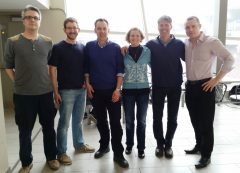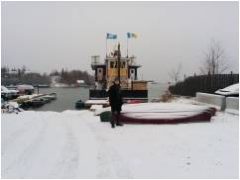CSERC works with the Canadian High Arctic Research Station on the State of Alternative Energy in the Arctic
In 2014-2015, Canadian High Arctic Research Station (CHARS), of Aboriginal Affairs and Northern Development Canada, retained a team of CSERC researchers to work on alternative energy sources in the Arctic in a project entitled The State of Alternative Energy in the Arctic.
The team was led by Carleton professors Stephan Schott and Alexandra Mallett supported by Carleton alumnus David Cherniak, Carleton Master’s candidate Vincent Dufresne, and Trent Master’s candidate Lawrence Keyte.
 |
| Research Team (from left to right): Vincent Dufresne, David Cherniak, Stephan Schott, Alexandra Mallett, Lawrence Keyte, and Michael Brown of CHARS (AANDC) |
The team was to address the research using a CSERC-signature multidisciplinary approach encompassing engineering, social sciences, and business.
The research entailed alternative energy options for electricity supply as well as space and domestic water heating. The report encompassed sustainable energy solutions such as hydro, wind, solar, biomass, geothermal and waste-to-energy resources, in addition to demand side management such as building envelope upgrades and grid optimization. Researchers conducted a review of the state of development of alternative energy across five Arctic jurisdictions in Canada, namely: Yukon, Northwest Territories, Nunavut, Nunavik (QC), and Nunatisiavut (NL).
Most sources of energy in the North need to be subsidized in order to keep them affordable for people living there, which is why Northerners are seeking alternative sources of energy. Alternative energy may help reduce Northerners’ dependency on energy subsidies, freeing up money for pressing needs to cover other issues including health, housing or food security costs. Even with subsidies, residents in some Arctic communities pay a high costs for electricity and heating. Alternatives might help reduce these costs for Northerners. Greenhouse gas emissions due to diesel generation and concerns over climate change are also key considerations.
Research examined how decisions were made with regard to alternative energy in the Arctic. This was done through an assessment of Arctic energy policies and a closer examination of specific case studies to help understand the motivations and challenges involved in adopting alternative sources of energy in Canada’s North, including potential solutions to increase the adoption of alternative energy when appropriate.
The team carried out a thorough literature review, interviewed with key northern stakeholders, went to Yellowknife to participate in the 2014 Northwest Territories Energy Charrette in November 2014, and delivered a workshop with Northern research partners.
 |
| A member of the research team in Yellowknife, NWT |
The final report delivered to CHARS included a cross-jurisdictional alternative energy policy review, a discussion on the state of financial and economic analysis for supply-side and demand-side energy options, a number of selected in-depth case studies across the Arctic, a policy discussion, and future research recommendations for CHARS.
For more information, communicate with Professor Stephan Schott and Professor Alexandra Mallett.